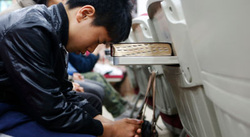
North Korea on Tuesday urged all foreign companies and tourists in South Korea to evacuate, saying the two countries are on the verge of nuclear war.
Spokesman for the Voice of the Martyrs USA Todd Nettleton says, "They encouraged foreign embassy workers in Pyongyang to exit the country prior to April 10 because they could not guarantee their safety after that date. It's hard to know what to make of that, but definitely it is an escalation of what we've seen in past years."
Pyongyang's ominous threat raised fears that it will conduct some kind of missile test on Wednesday, which risks retaliation. The United States, South Korea and Japan have all raised defenses. However, analysts see a direct attack on Seoul as extremely unlikely.
Spokesman for the Voice of the Martyrs USA Todd Nettleton says, "They encouraged foreign embassy workers in Pyongyang to exit the country prior to April 10 because they could not guarantee their safety after that date. It's hard to know what to make of that, but definitely it is an escalation of what we've seen in past years."
Pyongyang's ominous threat raised fears that it will conduct some kind of missile test on Wednesday, which risks retaliation. The United States, South Korea and Japan have all raised defenses. However, analysts see a direct attack on Seoul as extremely unlikely.

"There have been reports of military exercises inside North Korea," Nettleton comments. "Again, how normal is that? Do they always do exercises at this time of year when the U.S. and South Korea do theirs? Is this in addition to what they'd normally do, or is this part of it?"
World watchers note uncertainty as a result of reaction from the European Union and the United Nations. The EU believes there is a "limited risk" of war in Korea, while U.N. Secretary General Ban Ki-moon called the situation there "very dangerous."
Confused by the mixed signals yet? You're not the only one, says Nettleton. "It's hard to know how much stock to put into what the North Koreans are saying. They obviously have a history of creating crisis, then negotiating some type of return out of that crisis in order to make it go away."
What makes this different, he goes on to say, is that "they have now officially taken their nuclear program off of the negotiating table, which, in past years, they have negotiated away the nuclear program in exchange for aid or concessions."
Leader Kim Jong Un is an untried leader with a lot to prove as a decisive military leader, Nettleton notes. That's what's driving the approach to any talks. They're likely to insist that "the nuclear program is so intrinsic to their economic development and to their sovereignty as a nation that that's no longer on the table. They're no longer willing to give that up. That really changes the dynamics, as far as negotiations."
According to reports from persecution watchdog Open Doors, many cars on the roads are covered with camouflage nets. Also, soldiers are wearing hats with camouflage dried branches and carrying guns. Kim Jong Un released a statement to his people, saying, "If war breaks out because of the actions of the U.S. and puppet South Korean's unpardonable behavior, they will end up with a disgraceful downfall, and our people will greet a brilliant new day of reunification. The day has come to show off the power of ‘Military First' and our great nation to the whole world."
South Korea, meanwhile, says that even if no actual weapons exchange fire, the barrage of threats amount to "psychological warfare." Nettleton agrees. "It's an incredibly closed country—probably the most closed on the earth. We just don't know because there's not enough communication, there's not enough information passing back and forth to really say with any real accuracy ‘Here's what's going on.'"
For Christians, the suppression remains severe. Those caught with a Bible usually face death or internment in a labor camp. Christians report that they are still being completely isolated from the outside world. It is estimated that between 50,000 to 70,000 believers are languishing in prison camps.
For underground believers in North Korea, explains Nettleton, prayer has become their lifeline. "One of the things that we can pray is just for God's protection over the Church and over the Christians there. They are singled out for the very worst treatment and the worst oppression and persecution as 'Enemies of the State.' Even though they're not, they're seen that way by the government."
World watchers note uncertainty as a result of reaction from the European Union and the United Nations. The EU believes there is a "limited risk" of war in Korea, while U.N. Secretary General Ban Ki-moon called the situation there "very dangerous."
Confused by the mixed signals yet? You're not the only one, says Nettleton. "It's hard to know how much stock to put into what the North Koreans are saying. They obviously have a history of creating crisis, then negotiating some type of return out of that crisis in order to make it go away."
What makes this different, he goes on to say, is that "they have now officially taken their nuclear program off of the negotiating table, which, in past years, they have negotiated away the nuclear program in exchange for aid or concessions."
Leader Kim Jong Un is an untried leader with a lot to prove as a decisive military leader, Nettleton notes. That's what's driving the approach to any talks. They're likely to insist that "the nuclear program is so intrinsic to their economic development and to their sovereignty as a nation that that's no longer on the table. They're no longer willing to give that up. That really changes the dynamics, as far as negotiations."
According to reports from persecution watchdog Open Doors, many cars on the roads are covered with camouflage nets. Also, soldiers are wearing hats with camouflage dried branches and carrying guns. Kim Jong Un released a statement to his people, saying, "If war breaks out because of the actions of the U.S. and puppet South Korean's unpardonable behavior, they will end up with a disgraceful downfall, and our people will greet a brilliant new day of reunification. The day has come to show off the power of ‘Military First' and our great nation to the whole world."
South Korea, meanwhile, says that even if no actual weapons exchange fire, the barrage of threats amount to "psychological warfare." Nettleton agrees. "It's an incredibly closed country—probably the most closed on the earth. We just don't know because there's not enough communication, there's not enough information passing back and forth to really say with any real accuracy ‘Here's what's going on.'"
For Christians, the suppression remains severe. Those caught with a Bible usually face death or internment in a labor camp. Christians report that they are still being completely isolated from the outside world. It is estimated that between 50,000 to 70,000 believers are languishing in prison camps.
For underground believers in North Korea, explains Nettleton, prayer has become their lifeline. "One of the things that we can pray is just for God's protection over the Church and over the Christians there. They are singled out for the very worst treatment and the worst oppression and persecution as 'Enemies of the State.' Even though they're not, they're seen that way by the government."


 RSS Feed
RSS Feed